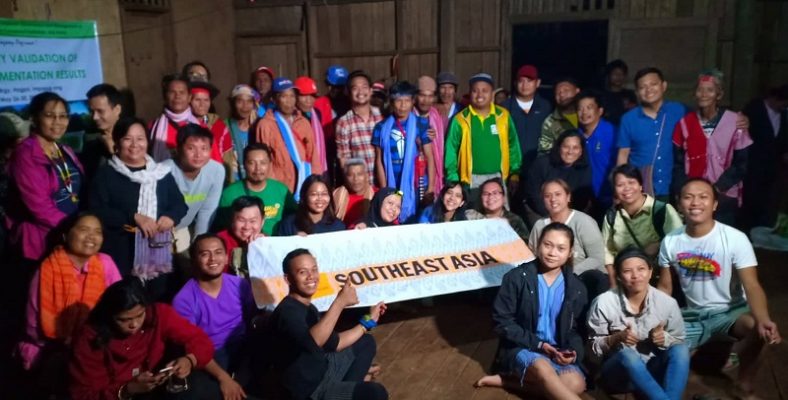First published on 08/30/2019, and last updated on 08/31/2019
By Tanya Conlu, ICCA Consortium Coordinator for Southeast Asia, on behalf of NTFP-EP.
In line with the ICCA Consortium’s initiative of highlighting sustainable livelihoods, the ICCA Southeast Asia Regional Learning Network made this theme the focus of their first learning event, held in May 2019. Twelve participants from five countries traveled to Malaybalay City, Bukidnon, in the Philippines, for a crash course in community-based enterprise development given by Non-Timber Forest Products – Exchange Programme (NTFP-EP) Philippines, a group that has been establishing NTFP enterprises with indigenous peoples for the last two decades.
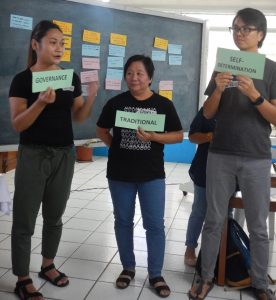
Discussing, connecting, and agreeing on concepts and perspectives of sustainable livelihoods and ICCAs © Tanya Conlu
Through workshops and video documentaries, the presenters and participants discussed the interconnected concepts of livelihoods, subsistence, enterprise, and governance, and how all of these are embodied in ICCAs. They argued for the use of traditional practices in forest conservation and resource management, because these have proven to be the most effective solutions. Throughout the sessions, the emphasis was on the importance of enterprises that are compatible with the culture of communities, and include their young people, in addition to being profitable.
The group brought its attention, too, to the many challenges and pitfalls of developing economies: the failure of investors to connect with communities and other players in the value chain, the lack of access to capital and information, debt traps laid by financiers and traders, restrictive policies, and the promotion of more profitable products which are not eco-friendly or which have no connection to cultural identity. Such concerns present real challenges to starting and maintaining an enterprise.
Establishing an enterprise with a community should mean investing in people, respecting cultures, conserving resources, and meeting local needs. This entails gaining a community’s trust, guiding the members to make their own decisions, and supporting them every step of the way until they are able to run their enterprise on their own.
Speakers from the Higaonon indigenous community of Mintapod shared their experiences with their own governance and enterprises, particularly their weaving industry, a craft that has gained them international recognition. Hinabol, a cloth woven from abaca fiber and known as peace cloth, is traditionally offered as a gift and peace offering. Every pattern is the artistic creation of an individual weaver and has a story of its own. Over the years, the Higaonon have managed to create a business out of the hinabol and have revived the weaving tradition that had been slowly becoming forgotten and lost.
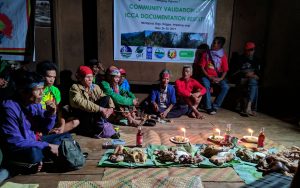
Traditional ritual to welcome the participants to the community © Gordon John Thomas
The Mintapod territory is situated high in the mountains in the midst of a thriving forest, far from the town center, far from electricity and cellular signals. The conference participants had the opportunity to visit the community, and after a long ride over rough roads, they shared in a ritual of welcome. Their arrival coincided with the closing festivities of the community’s annual three-day forest walk, which had just ended. This annual walk is a time when the elders go into the forest with the young people, and teach them about traditional ways of hunting, identifying forest food and medicine, and other life skills.
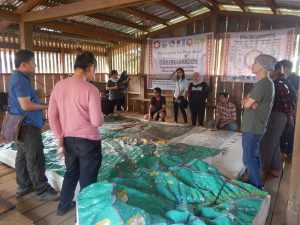
Participants discuss Mintapod’s 3D map showing sacred sites with the staff of NTFP-EP Philippines © Tanya Conlu
The participants, which now included the community members, identified the loss of youth to mainstream culture and livelihoods as a major and existential challenge. The forest walk and the community’s School of Living Tradition are ways to preserve and pass on their culture and traditions to their children. They also have an active youth group that learns and performs traditional dances. This group is now venturing into enterprises, as well, because, as the youth leader explained, even if the people can still live off their forest, their needs are changing, and they want to send their children to school.
While there, the participants had a chance to visit the local store of hinabol products. The marketing arm of NTFP-EP Philippines in Manila maintains shops throughout the country that sell these and other products from various indigenous communities. Dozens of tools and strategies for starting, growing, and maintaining enterprises were shared throughout the five days, but the overarching theme was that livelihoods are intrinsically related to culture and territory, and that community-based enterprises only thrive and become sustainable when they are rooted in culture and strong traditional governance.
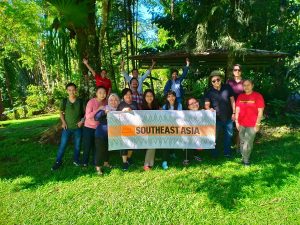
© Arnie Ocampo
Featured image : Participants with community members and other guests at the culminating festivities of the annual forest walk, © Arnie Ocampo.
